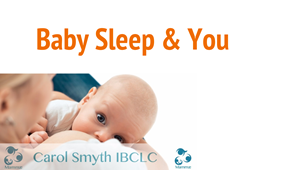I am an IBCLC (International Board Certified Lactation Consultant) in private practice in Northern Ireland and a La Leche League Leader with La Leche League of Ireland
Baby Feeding & Sleeping - Coping when reality isn't what you expected (AKA Baby won't fit the schedule and I'm exhausted)
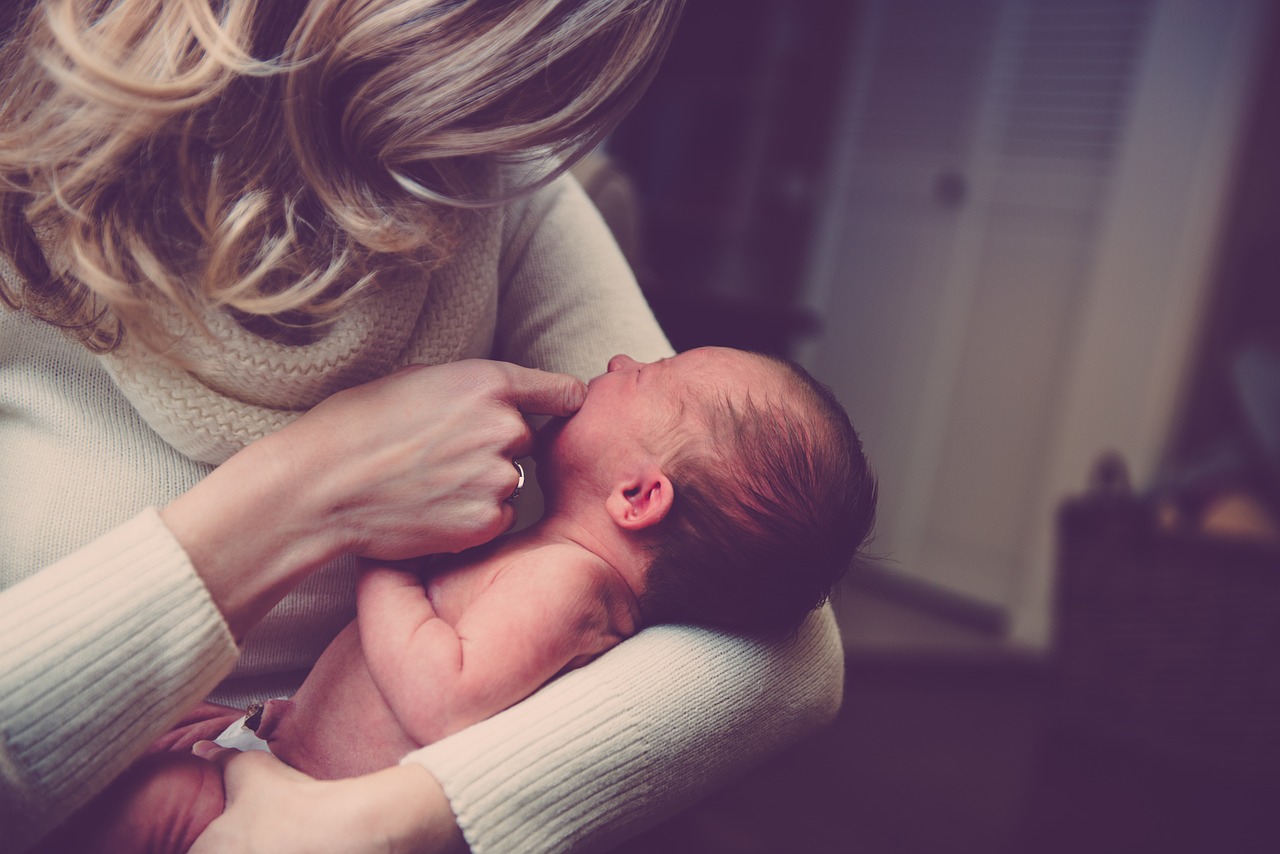
A baby arriving is such a shock to the system isn't it? I don't just mean physically, but to the system of life that we have created around us. Our sense of control of our lives. Our ability to get adequate sleep. Or ability to do the things we want to do, when we want to do them. Our sense of how we and our partners / families / friends interact and function together. Suddenly everything is tossed upside down. It's overwhelming. We have no idea when that baby is going to want fed, or for how long that feed might be. We have no idea when the next sleep is coming, or how long it might be. Our baby intensely needs to be held, fed, to suck and requires pretty constant care. It's exhausting.
At the start many of us are totally ok with this. We expected it might be tiring when our baby was brand new, but as the days turn into weeks and we are still finding the intensity of a baby difficult and the lack of sleep hard to cope with we start to long for some kind of structure, some sense of control of our lives again. To add to this we often start getting questions about whether our little one is in a routine, whether they are sleeping well for us etc, and all of this is a perfect recipe for anxiety, stress and in response to that - an unsettled baby.
This blog is essentially the bridge between my previous writing on the Social Nervous System (which discusses how our own stress levels can create unsettled behaviour in our babies) and my blog on Sleep Programs (discussing how we, as parents, struggle with adequate sleep). If you haven't already read them, you may want to read them either before or after this blog, as hopefully this article will pull them both together in a way you might not have considered before.
Suddenly our days, weeks, months become centred around this other person who defines a lot of what we are doing that day, and when we do it. We may be feeding 12 times a day, and some of those will certainly be at night, disrupting what we have previously seen as a "normal 8 hour sleep". It's not necessarily normal (see my Sleep Webinar for normal physiological sleep), but it is how we have learned to function and get enough sleep till this little baby arrived. Now, with a newborn we may be losing a few hours of sleep every night, we have a cavalcade of hormonal changes, and all of that is accompanied by an increased physical and mental workload of caring and parenting. This extra workload comes with little to no training, for first time parents it usually comes with little to no previous experience, yet it is a task with high stakes. There is nothing more important to us than caring for this little baby and trying to get it right. We don't know if we're doing it right. We're bombarded with articles on the internet telling us what our baby should be doing, what we should be doing, risks to their behaviour and their future mental health if we don't do it right. It's massively anxiety producing. Is it any wonder that 1 in 5 first time mothers and 1 in 6 subsequent mothers experience post natal anxiety.
Breastfeeding is part of an evolutionary strategy designed to help us deal with these difficulties. Breastfeeding is a biologically rewarding and protective program for both sides of the dyad. Obviously the baby gets milk, and all the immune and developmental guiding components, but there are also big rewards in producing that milk. Breastfeeding bathes us in oxytocin, prolactin, dopamine. It inhibits corticosteroids, our stress hormones. Breastfeeding creates a feeling of calm, of safety, leaves us less tense, also less bored, it lowers our blood pressure. In fact in rat studies breastfeeding was found to be more rewarding than cocaine. Breastfeeding makes us feel good and makes us harder to stress, but it doesn't lower our anxiety to zero. Many of us still suffer from anxiety. If we are struggling with breastfeeding, perhaps with pain - that interferes with the feelings of reward. Since we know that breastfeeding is natural, we seem to assume it should be easy and then start to feel worry and self blame that if we are struggling, we must not be doing it right.
Searching For Our Sense of Control
Birth plunges us into a world where we have less sleep, new responsibilities, new skills to learn, both real and imagined social and/or familial pressures. On top of this we suddenly lose our sense of control about our basic needs like when we will be able to get sleep or to get time to cook a meal, or to drink a hot cup of tea or coffee, or to be able to leave the house at a time that we had planned. Some of us cope with this lack of structure better than others and that is likely personality based. Some of us are very relaxed about timings and can easily go with the flow. Some of us thrive with structure and having a plan for the day - even if we have just figured out that plan in our head in the morning. Someone who likes structure may find this loss of structure and loss of control much more difficult and anxiety producing.
A 2008 study (Keeton et al) looked at this idea of control and of anxious or depressive symptoms and found the following:
a sense of control served a protective function for mental health outcomes. A higher sense of enduring control predicted lower levels of psychological distress for new parents, and increases in control over time predicted decreases in depression and anxiety.
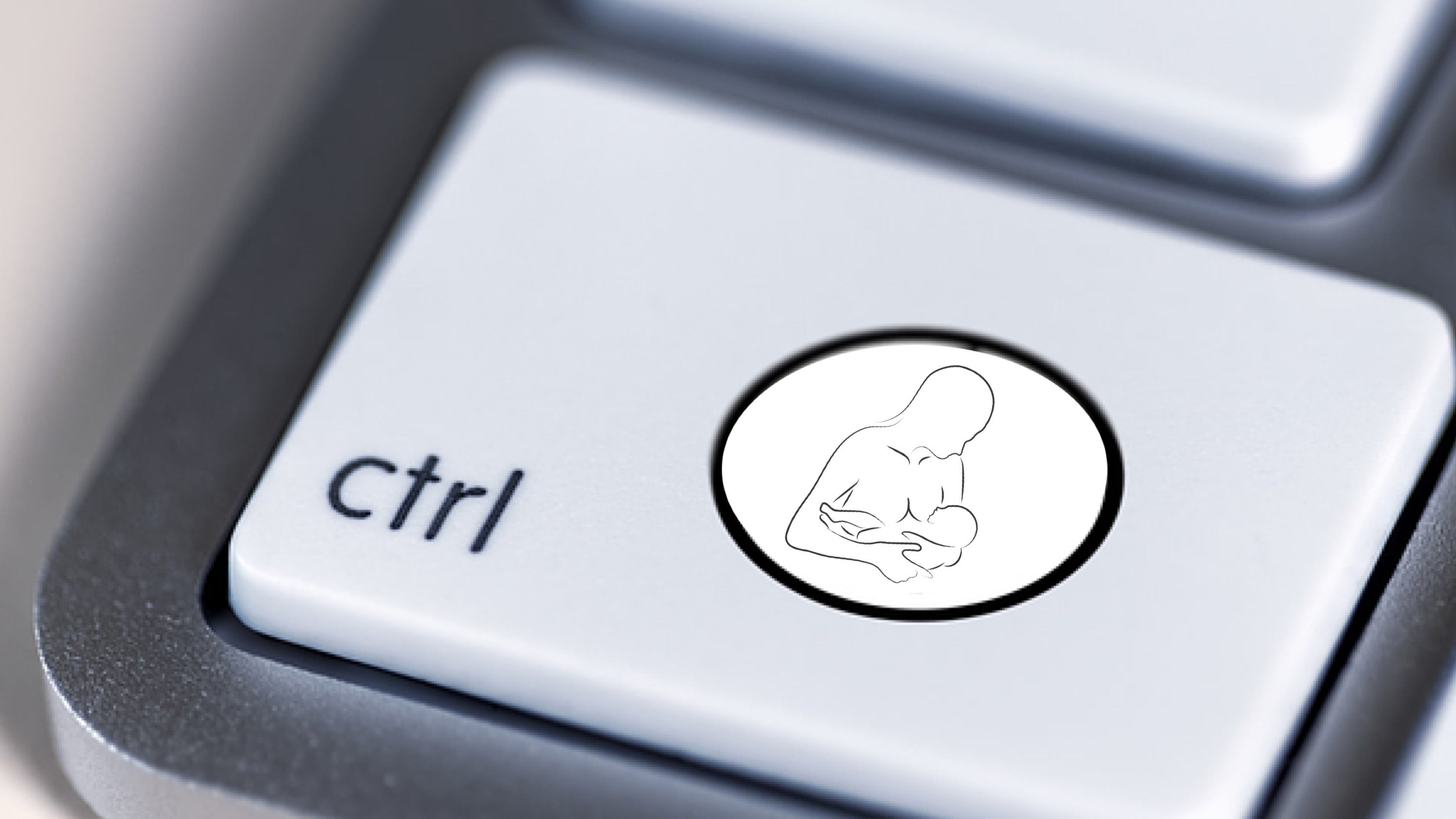
We all want to feel like we know what we are doing and can handle what might happen in a given situation. That makes us feel safe and calm. What we want is to feel competent in whatever roles we are in, whether that be in our work or in our parenting/caregiving. The American Psychological Association define competence as:
the ability to exert control over one's life, to cope with specific problems effectively, and to make changes to one's behavior and one's environment, as opposed to the mere ability to adjust or adapt to circumstances as they are.
When we feel out of control we don't feel competent. So what do we do when we feel out of control, sleep deprived and anxious? Well, what we want to do is to try and regain some control, and when we look around for how to do that we are presented with sleep programs, feeding programs, whole baby care programs, predatory online marketing, advice from friends and family to give a bottle so that baby sleeps better, to feed from one side to get the fatty milk so that you can get into a routine (please see this blog on hindmilk about why this is not good idea). We hear suggestions about using a dummy, about leaving the baby with others to get into a routine, or starting solids early. If we have a good day where everything seems easy we over-analyse the day to figure out what was the magic fix that day. Was it because you stayed in the house that day, or was it because you saw friends? Was it because you did or didn't eat X? Did baby sleep better because you did or didn't do a dreamfeed? We desperately try to replicate the conditions of that day in the hope that it will be repeatable, but it usually isn't, because the only constant with a baby is change!
Do those of us who try the baby sleep and feed routines regain a sense of control, a sense of competence and a lowering of anxiety? Not, according to the research. Research looking at mothers who used books advocating strict routines found that on the whole they had a negative effect. 53% of women who used the books felt more anxious after using them (Harries & Brown 2017). A fifth said they felt like a failure as they were unable to make the routines work.
Routines assume that babies work a bit like robots - that they are roughly identical units with the same developmental and personality makeup and the same needs. Therefore given adequate calories they should be able to go to sleep at the same times, sleep for the same lengths of time and be alert and play (usually quietly) for the same length of time. The problem is that babies are people. They are individuals. Do you wake up at the same time as all the other adults you know? Do you eat and sleep at the same times? I bet not. Are you someone who can sleep anywhere, or are you one of us who can only sleep easily at night in bed.
We are not robots. We don't work like that. Same input doesn't necessarily equal the same output. We don't all have the same motherboard and hardware.
Crucially though the big issue with routines is that they give the impression that we can control the baby. By following this set of instructions we can control when that baby will wake, feed, play, sleep. We will have regained control of our lives, and hence our sense of competence and will lower our anxiety. That sounds great - but we can't control other people. We can't control when our baby will drift from a deep sleep into a light sleep and wake any more than we can control when our neighbour wakes or leaves the house. We can't control how long that breastfeed will take, or how baby will behave at the breast during that feed. We can't control other people. We can only control ourselves, and sometimes we even struggle with that (can you leave that chocolate in the cupboard for another day?).
Some babies will fall into a routine. That's who they are. Others absolutely won't. That's who they are. Trying to force a routine often doesn't work, and makes us more anxious because we starting worrying about why our baby isn't behaving how we think they should rather than just accepting the reality of who this little person IS.
Neuroception & Baby Fussiness
If you haven't read my Social Nervous System blog yet, this might be a good time to visit it. It describes how we are always picking up cues from each other about safety or danger in the environment around us. It's how we can walk into a room of friends who are laughing and are open and welcoming and we immediately relax. Equally if we walk into a room of friends we pick up if one friend seems very anxious or unsettled without them having to say anything. It's a perception that psychiatrist Stephen Porges calls neuroception.
Babies rely on neuroception to tell them whether the world around them is safe or dangerous. They regulate themselves from our bodies when we are holding them. We often tell new parents about the benefits of holding their newborn - that their heartbeat regulates baby's heartbeat, that their temperature regulates baby's temperature etc. If we are stressed however our bodies show those signs of stress. We enter a fight or flight state. Our heart beat increases a little, our muscle tension increases, our breathing quickens. Many of us live in a slightly anxious state a lot of the time and don't even realise the body tension until someone tells us to relax our shoulders or breathe more slowly. Then we suddenly realise our muscles have been tight and tense. Babies feel it though and they get a sense that the world is a little worrying right now. This puts them into a slightly fight or flight state and they become more unsettled and fussy. What is the effect of this? We feel more anxious and more out of control.
Lets add lack of sleep into this. What happens when we don't get enough sleep? Well, it causes an increase in stress. Normally we have a daily cycle of cortisol. It rises early in the day and decreases before our usual bedtime to allow us to relax and go to sleep, but research suggests that not getting enough sleep for 6 consecutive days means that the cortisol doesn't decrease as much (Spiegel et al 1999). Cortisol in turn increases adrenaline - which increases muscle tension. Is this part of why so many babies have fussy evenings? Is it why sometimes parents have difficulty getting to sleep even though they are tired? What about that 2nd wind many of us get mid afternoon after a real tired slump? Well that's often due to a surge of cortisol and adrenaline to help keep us awake.
This can lead to a vicious cycle of anxiety, search for control, worry about lack of control and lack of sleep.
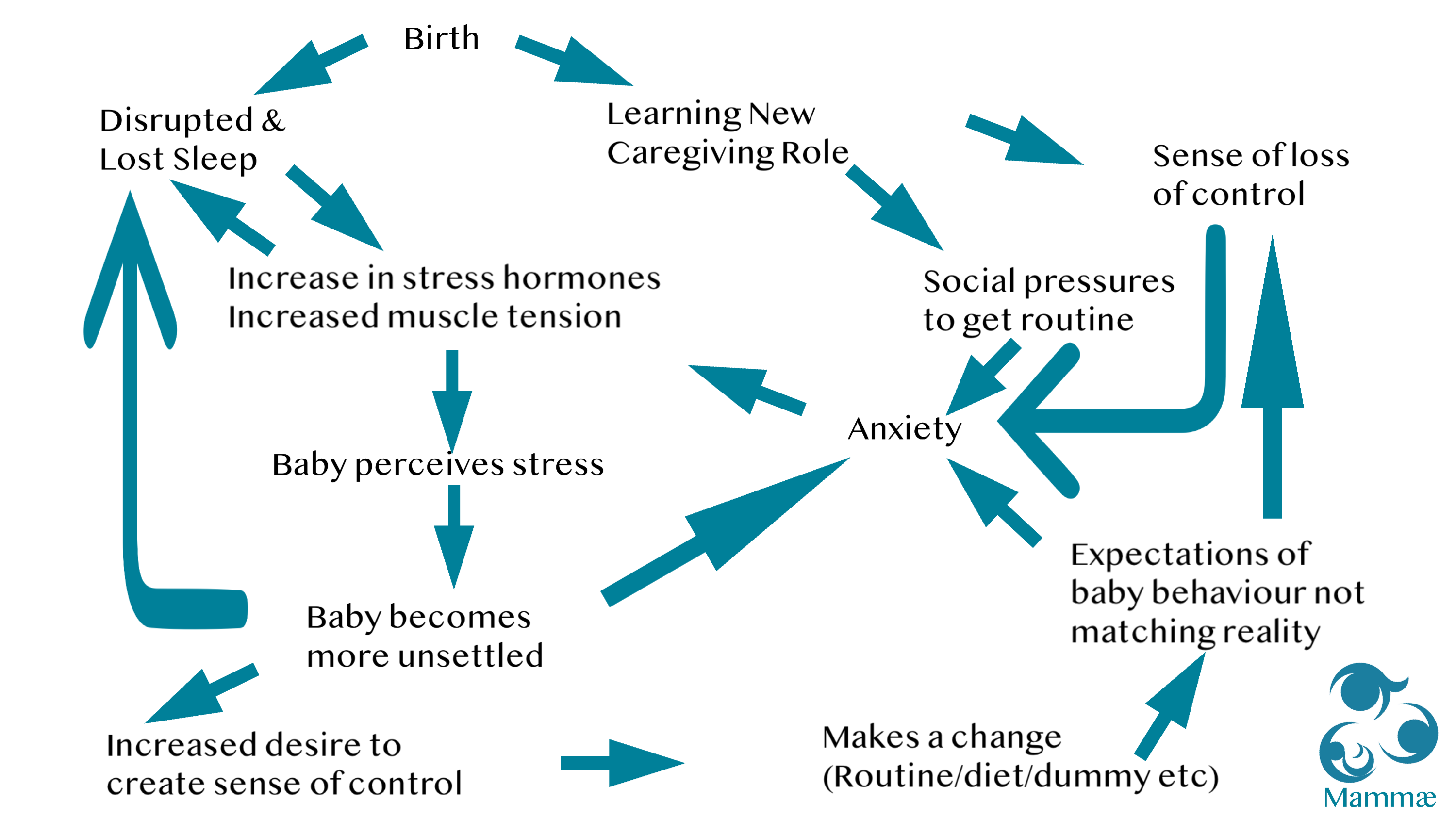
Reducing the Stress
The early weeks and months of life with a baby can be stressful. It is physically stressful (lack of sleep) even if baby feeds and behaviour is regularly and predictable. In their study looking at sense of control and anxiety/depressive symptoms in new parents, Keeton et al state:
Becoming a parent is considered one of the most demanding and stressful life transitions an individual will face
The National Institute of Mental Health estimates that 50–80% of women experience postpartum blues, sadness, anger, or anxiety after giving birth that can last months, so most of us experience some difficulty, although it is a smaller number who experience anxiety to a clinical level.
So how can we best cope with this difficult life period? How can we reduce our stress and anxiety? How can we get more sleep and relaxation?
1. Breastfeed
We've already discussed how new parenthood is stressful/difficult for the majority of parents at least at some stages in the early months. Where there is a difficult biological process that we need to perform, evolution normally provides us with a mechanism to get us through or reduce the difficulty. In labour we release strong endorphins. Long distance runners get a runners high. With a baby we get breastfeeding. Breastfeeding lowers stress hormones, it makes us feel safe and secure. It makes us feel sleepy, making it easier to fall asleep after those sleepy night feeds. Research tells us that breastfeeding is a protective factor against postnatal stress, and that breastfeeding mothers get more sleep than those who are either mix feeding or formula feeding. Nature has created a situation where the normal stress of raising a baby is punctuated by very frequent blocks of time that we need to stop, we need to feed that baby and we are bathed in oxytocin, prolactin, dompamine and our stress hormones are inhibited. It's pretty clever when you think about it.
If you are having problems with breastfeeding, seek skilled help. If you are in pain, for example, that reward cycle of hormones is not going to be triggered in the same way and so the stress lowering response is not going to be activated in the same way. Look for an IBCLC if possible.
2. Rest / Sleep
Sleep is going to be disrupted with a baby. There's no getting away from that. A young baby is going to need to feed at night for quite some considerable time. Expecting that they will begin sleeping through the night at 3 months, or that you can create a routine that will get them to sleep through the night in the early months is not realistic for most babies. Expecting that if they sleep through the night (5hrs) once then they will always do it, or should always be able to do it is not realistic for most babies. This idea really came from a flawed interpretation of old sleep research and there is more on this in the Sleep blog. In reality almost 1/3 of babies are not sleeping through the night at 1 year (Henderson et al 2010).
You may be told that giving a bottle at night will help your baby to sleep longer and that way you will get more sleep, but the research doesn't really back this up. Research, in fact shows that breastfeeding mothers get more overall sleep than those who are mixed feeding or formula feeding (Doan et al 2007, Doan et al 2014). All those sleepy hormones help breastfeeding mothers to fall back to sleep more quickly after night feeds. Newborns may sleep 16 hours a day. Even at 6 months babies are sleeping on average 14 hours a day (Galand et al 2012). That's a lot of hours to get some extra rest and sleep. Admittedly it is harder with older children as well. Even if we can't sleep though, we could probably all rest a bit more than we do. Many of us have a lot of self imposed pressure. We have these expectations that we should be able to do it all. We should get out with our new baby. Both of us should be well groomed. We should be able to keep the home in good order. We should be able to get enough rest and to care well for our baby/babies. We should be able to plan our day and have ourselves and our baby stick to that plan. Is this realistic? Something often has to give. Does it have to be sleep? Could the plan a couple of days a week actually be to rest?
If you are really struggling with lack of sleep however and need something to change - that's ok. Ask for help.
If you want to understand more about what is normal sleep development and what is realistic or ideas to make changes to gently nudge a baby to sleep longer there is also a longer webinar here.
3. Be Aware of your Stress
Check in with your body during the day. You may be holding more muscle tension than you think from all that increased cortisol. Throughout the day, make a point to check your tension. You could try it while feeding. When you sit down to feed take a moment to think about your shoulders. Are they against the seat? Are they hunched? Can you lift them and drop them down your back. Does that feel different? What about your breathing? Are you breathing right down into your belly? Or is your breathing motion up in your chest area? Try taking some deep breaths with long exhales. This will start to slow your breathing and your heart rate and start to lower your stress response. Doing this multiple times during the day can make a big difference. It may make your baby less fussy too. It may even help you both to sleep better, and if it doesn't you'll be better able to cope with it.
Do you need some help to manage your stress? If you are feeling anxious most of the day for at least 2-3 days a week, think about talking to your GP about it, as therapies like cognitive behavioural therapy may help. Contact me if you would like to find out more about my CBT sessions.
4. Review your expectations
This is the most important part, and perhaps the hardest to do. Many of us, when we have a first baby have very unrealistic expectations of feeding and sleep. We have been fed a myth of babies feeding 3 hourly, and that we'll start to get long stretches of sleep by 12 weeks. We are often completely unprepared for the overwhelming needs, and what seems like a relentless cycle of feeding, and nappies. We had no idea how tired we would feel at times, and assumed that we would have a routine a few weeks or months in. These ideas can hit very hard against reality. Our new reality. This mismatch between expectations and reality can be damaging and stressful. Let me explain how. Let's take for example that you expect that your baby will feed 3 hourly and you believe that to be a correct/ ideal feeding pattern. Your baby cues for feeds every 2 hours though. Each time your baby cues, you may pick up your baby, but you check the time and spend the feed thinking "that's only 2 hours. He shouldn't be hungry yet." You will have an underlying stressful thought from that. It may be, "I mustn't have enough milk" or it may be, "I'm not doing this right," or it could be "what's wrong with my baby that he won't stretch longer between feeds". Whatever the thought is, it will create some kind of emotion. That may be worry, fear, anxiety or self blame. Emotions come with physical properties, so that worry/fear /anxiety will create a stress response which will increase your blood pressure, increase your muscle tension, increase your cortisol. Yes breastfeeding will limit the response somewhat, but the stress response is coming from the thought. If we can review and correct the expectation however we can lower or stop that stress response. So now when your baby cues 2 hours after the last feed, and you latch him on and check the time, you may have an initial thought about 2 hours being too little but you can reframe it. If you stop and say to yourself, "actually the research says that feeding every 2 hours is normal, " then the negative emotion is not generated, the stressful body symptoms aren't created and the stress response is stopped or lowered. This is the basic premise of CBT.
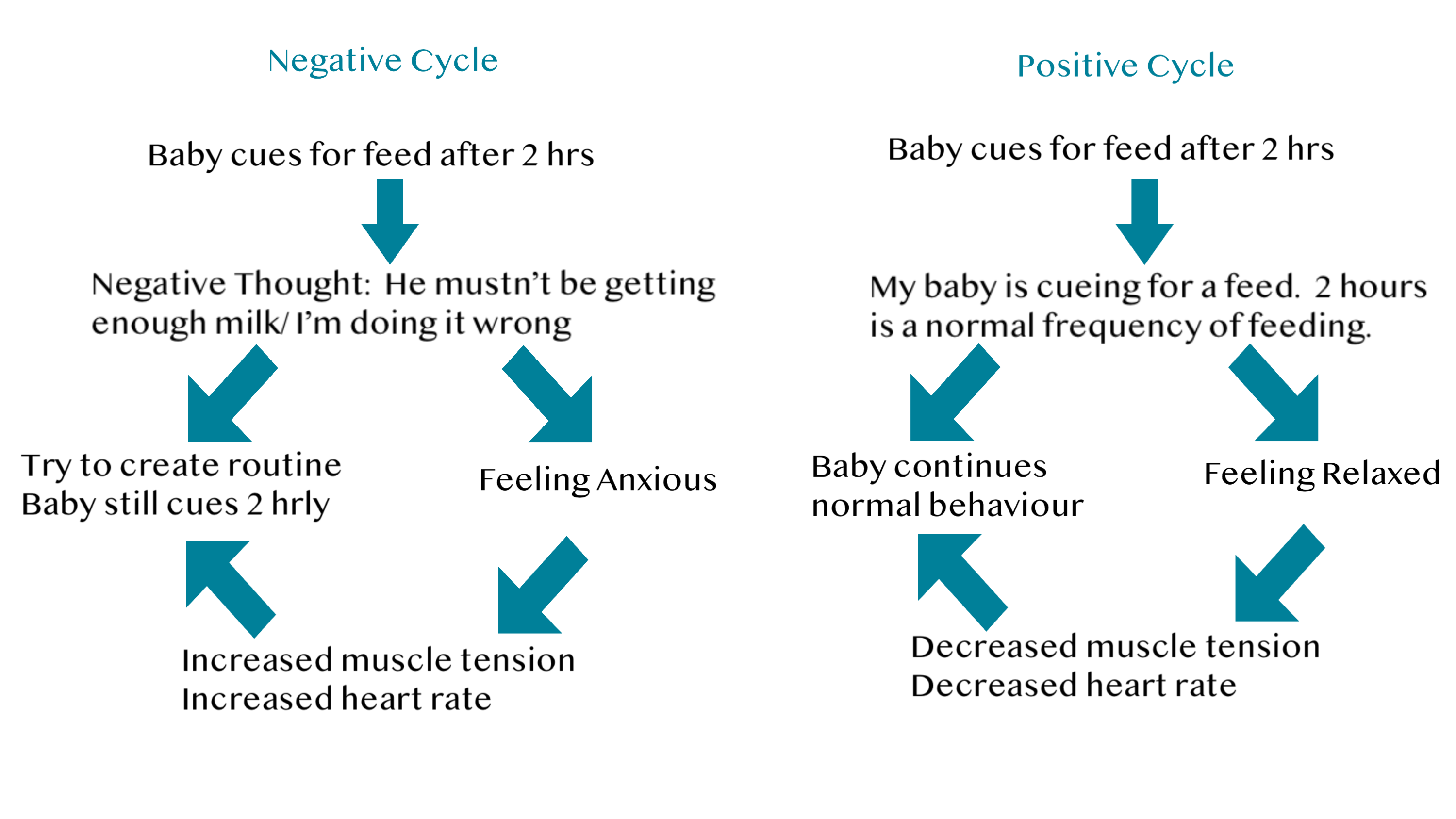
There are a few things that you really need for this to work though. You need accurate information so that you can ensure that you create realistic expectations. You may or may not get this from friends / family / the internet. You may or may not get it from your HCP - I've heard all kinds of inaccurate information be given to women before around feeding and sleep. So where do you get it? My suggestion would be to find breastfeeding communities where breastfeeding is normal and you can meet women who are feeding for as long as they want to - groups like La Leche League where you will be given evidence based information that works. Look for a local IBCLC that you can run your ideas and expectations past. Read websites and books that are recommended by or written by those groups and people. Go to your breastfeeding group regularly if you can. It will help you to regularly challenge your expectations (which have usually be set by years of marketing).
Try not to compare your baby to other babies. If your friend has a baby who sleeps a 5 hour block every night and your baby only sleeps for 3 it doesn't mean that she is doing something different from you. It doesn't mean that you can make your baby do what her baby is doing. Some people can roll their tongue. Others can't. All the training programs in the world won't change it as far as I know. You can either genetically do it or you can't. Babies are people. We have different needs, different abilities and develop skills at different rates.
Mostly - try not to fight biology. Babies feed frequently. They wake frequently. It's biology. Fighting it usually ends in self blame because you can't change it. Millions of years of evolution have created baby behaviour as it is. A routine in a book isn't going to change it, but you can change how you think about it, and that changes everything.
Baby Sleep & You Webinar
If you have any questions about a consultation or a CBT session, please get in touch.
Further Reading
1. Keeton, C. P., Perry-Jenkins, M., & Sayer, A. G. (2008). Sense of control predicts depressive and anxious symptoms across the transition to parenthood. Journal of family psychology : JFP : journal of the Division of Family Psychology of the American Psychological Association (Division 43), 22(2), 212–221. doi:10.1037/0893-3200.22.2.212
2. (2017) The association between use of infant parenting books that promote strict routines, and maternal depression, self-efficacy, and parenting confidence, Early Child Development and Care, DOI: 10.1080/03004430.2017.1378650
3. http://stephenporges.com/index.php/scientific-articles/scientific-articles/publicationss
4. National Institute of Mental Health. Understanding postpartum depression: Common but treatable.2005. Dec, Retrieved January 15, 2006, from http://www.nlm.nih.gov/medlineplus/postpartumdepression.html
5. Henderson JM, France KG, Owens JL, Blampled NM (2010). Sleeping through the night: the consolidation of self-regulated sleep across the first year of life. Pediatrics 2010 Nov;126(5):e1081-7. doi: 10.1542/peds.2010-0976. Epub 2010 Oct 25.
6. Doan T, Gardiner A, Gay CL, Lee KA (2007). Breastfeeding increases sleep duration of new parents. J Perinat Neonatal Nurs. 2007 Jul-Sep;21(3):200-6.
7. Doan T, Gay CL, Kennedy HP, Newman J, Lee KA (2014). Nighttime breastfeeding behaviour is associated wit more noctural sleep among first-time mothers at one month postpartum. J Clin Sleep Med. 2014 Mar 15;10(3):313-9. doi: 10.5664/jcsm.3538.
8. Galland BC, Taylor BJ, Elder DE, Herbison P (2012). Normal sleep patterns in infants and children: a systematic review of observational studies. Sleep Med Rev. 2012 Jun;16(3):213-22. doi: 10.1016/j.smrv.2011.06.001. Epub 2011 Jul 23.
Important Information
All material on this website is provided for educational purposes only. Online information cannot replace an in-person consultation with a qualified, independent International Board Certified Lactation Consultant (IBCLC) or your health care provider. If you are concerned about your health, or that of your child, consult with your health care provider regarding the advisability of any opinions or recommendations with respect to your individual situation.
